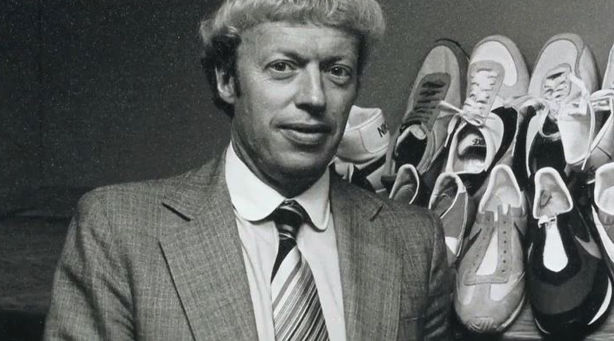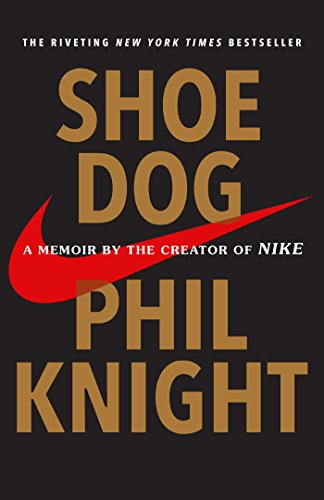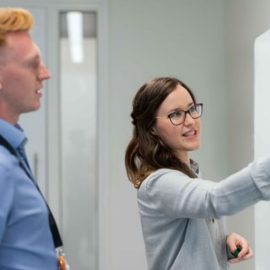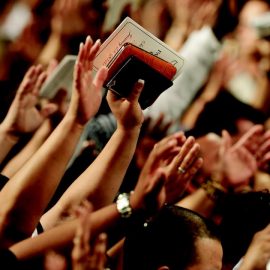

This article is an excerpt from the Shortform summary of "Shoe Dog" by Phil Knight. Shortform has the world's best summaries of books you should be reading.
Like this article? Sign up for a free trial here .
Phil Knight, the founder of Nike, started what would later become Nike in the 1960s when he was in his mid-20s.
What was young Phil Knight like? How did he come upon the idea of Nike, and how did he build it into the world’s most recognizable athletic brand?
Let’s start at the beginning of Phil Knight’s young life.
1962
Young Phil Knight has graduated from University of Oregon and earned an MBA from Stanford, and he doesn’t know what to do. He is 24.
His best lead is a final paper he wrote on shoes. Having been a decent runner on the U of Oregon track team, he’s obsessed with shoes. His paper’s thesis: Japanese companies are poised to burst into the shoe market, just as they had for cameras and displacing the German incumbents. This is his Crazy Idea. His way of making a mark on the world.
It seems obvious to him. He now has to travel to Japan, find a shoe company, and pitch them his Crazy Idea. Along the way, he wants to see and feel the world, for how can you change the world without seeing it? His traveling ambitions have a spiritual air, longing to understand how the Chinese and Buddhists and Greeks and Christians have thought about life for millennia.
There’s one barrier: he needs money. And his father is his best shot. Phil Knight describes his father as obsessed with respectability and grounding in traditional values, and wandering the earth seemed the antithesis of this. Phil’s quite sure his father will demur from funding his wanderlust. But to his surprise, the elder Knight approves, bemoaning his own lack of travel experience in younger days. Phil later realizes a major motivation for his global journey might be to define himself in opposition to his father – to be one who’s not obsessed with respectability.
With his Stanford friend Carter, they fly directly to Hawaii as their first stop. They are smitten by life on the island. Frolicking in the waves and surrounded by beautiful women, young Phil Knight decides his plan can wait.
So they get jobs as encyclopedia salesmen. Phil is a terrible encyclopedia salesman. He switches jobs to sell securities, which essentially means cold-calling customers to sell funds. He isn’t a smooth talker, but he knows his product, and he speaks the truth, and his customers like that. He quickly earns enough to cover rent and plenty of surfing time.
Eventually, though, his journey calls to him again. He has been in Hawaii for two months. It’s time to move on. His traveling companion Carter is now tied to Hawaii – he’s met a girl. Phil hesitates to travel alone, but soldiers forth. Soon, he’s in Tokyo.
Young Phil Knight travels around Tokyo, learning about Zen and observing the rubble remaining from World War 2. His father has two friends in Tokyo, and they dispense business advice – the Japanese are soft negotiators, not fans of the aggressive American style. They’re hard to read. (This will be relevant later.)
Phil feels like now is the time to act. He likes a shoe manufacturer Onitsuka and their shoe line Tiger, and he believes this is where he’ll make his start. He makes an appointment to meet executives and travels south to Kobe, Japan.
At the meeting, the Onitsuka staff ask him what company he’s with. He has no company and no name, but he thinks back to his childhood wall, decorated with blue ribbons from track. “Blue Ribbon Sports of Portland, Oregon,” he says. He launches into his presentation of his paper from Stanford business school, describing the size of the market and the vast opportunity there would be for a Japanese shoe manufacturer to enter America. They could undercut Adidas, the dominant brand at the time.
The executives are excited. They’ve been thinking about entering America for a long time, they say. They show him models of Tiger shoes that have promise. Finally, they ask young Phil Knight whether Blue Ribbon would be interested in representing Onitsuka in America. Phil accepts. He asks them to send samples to his address in Oregon.
He’s eager to return to Oregon and begin this new opportunity, but wanderlust gets the best of him. He routes through Hong Kong, Manila, Bangkok, Vietnam, and India, noting the poverty throughout the region. He wanders through Egypt, Jerusalem, and Rome, admiring the remains of the past. He finishes his trip through Paris, Berlin, Vienna, and London, a clear refined contrast to the poverty in Southeast Asia.
Of all his travels, he considers Greece his highlight – in particular, the Temple of Athena, the goddess thought to bring victory, or “nike.” While in stupor by the grandness of the place, he notices a carving of Athena – bending down to adjust her shoe
1963-1964
1963
Six months after he first left for Hawaii, Phil Knight returns home to Oregon. He greets his family warmly, but he’s concerned about one thing – have the shoes from Onitsuka arrived?
They haven’t.
He sends a letter to Onitsuka, and they reply promising the shoes will come in a couple of days. In the meantime, he needs a job. His father’s friend, CEO of a publicly traded company, advises him to get a CPA. If Phil Knightchanges jobs, both CPA and MBA degrees would surely prevent his salary from dropping.
———End of Preview———

Like what you just read? Read the rest of the world's best summary of "Shoe Dog" at Shortform . Learn the book's critical concepts in 20 minutes or less .
Here's what you'll find in our full Shoe Dog summary :
- How Phil Knight started Nike when he was just 24 years old
- The lawsuit that almost ended Nike
- The ups and downs of Nike over 20 years of business






